-
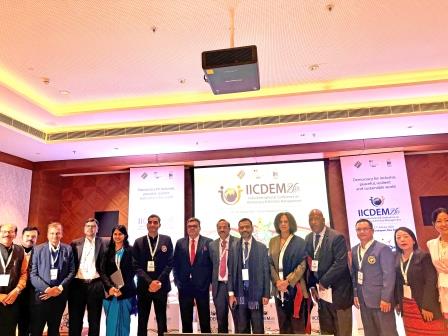 Team Arunachal Pradesh participates in IICDEM 2026; leads thematic…
Team Arunachal Pradesh participates in IICDEM 2026; leads thematic…
-
24hr bandh hits normal life in Lower Subansiri
-
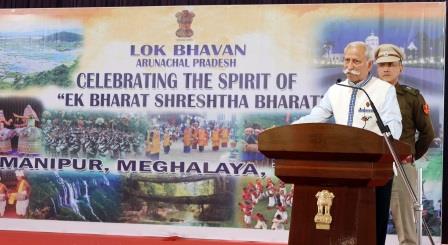 Lok Bhavan celebrates State Foundation Day
Lok Bhavan celebrates State Foundation Day
-
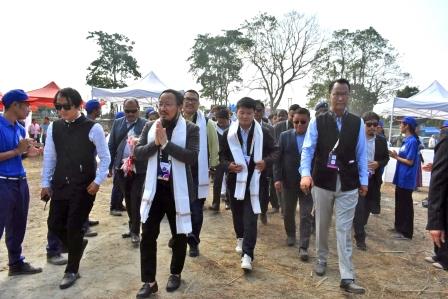 Arunachal Yuva Samanvay 2026 underway in Namsai
Arunachal Yuva Samanvay 2026 underway in Namsai
-
DA conducts Keyi Panyor Suvidha outreach campaign
-
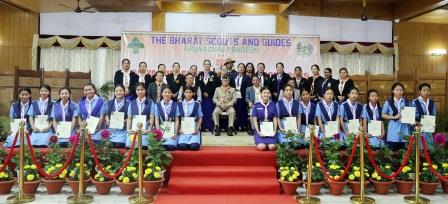 Governor confers BSG Rajya Puraskar
Governor confers BSG Rajya Puraskar
-
Pongte stresses use of technology in law-making
-
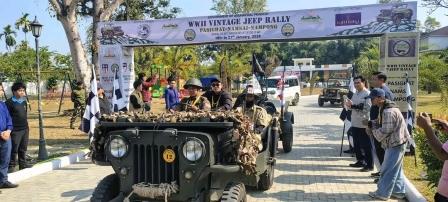 Vintage Jeep & Bike Rally commemorates end of World War-II
Vintage Jeep & Bike Rally commemorates end of World War-II
-
ARC partners with AITF, apex CBOs to lead strategic dialogue
-
Dibang Valley administration reviews progress of ongoing schemes
NAHARLAGUN, May 6: The Government of Arunachal Pradesh, through the National Program for Health Care of the Elderly (NPHCE) and the National Program for Palliative Care (NPPC) under the National Health Mission (NHM), in partnership with the Indian Association of Palliative Care (IAPC), has launched a comprehensive four-day certificate training program on foundational aspects of palliative and geriatric care. The training is being held from May 6 to 9, at a Naharlagun based hotel.
Palliative care is a specialized medical discipline that focuses on relieving the symptoms including pain and emotional distress associated with life-limiting illnesses such as cancer, aiming to enhance the quality of life for both patients and their families. The NPPC is committed to expanding access to such essential services across the state. Meanwhile, the NPHCE seeks to ensure healthy, dignified, and productive aging for all individuals aged 60 and above.
In alignment with these objectives, the NPPC and NPHCE have collaborated with IAPC—India’s premier organization for advancing palliative care, known for empowering professionals and institutions nationwide—to facilitate this impactful training initiative.
The program was formally inaugurated with an introduction of the esteemed faculty members, followed by an address by Dr. Geeta Joshi, President of the IAPC, who expressed gratitude to the National Health Mission (NHM), Government of Arunachal Pradesh. This was followed by a keynote address delivered by the Chief Guest, Marge Sora, Mission Director of NHM, Government of Arunachal Pradesh, who underscored the significance of elderly and palliative care in today’s society. On the occasion, Dr. Dukam Taipodia, State Nodal Officer (SNO) for NPHCE, unveiled a promotional video on elderly healthcare under the National Programme for Health Care of the Elderly (NPHCE) and extended a heartfelt vote of thanks, also highlighting the vital role of Comprehensive Primary Health Care (CPHC) within both the NPCC and NPHCE frameworks. Distinguished faculty members were felicitated with floral tributes in recognition of their expertise and valuable contributions.
Over the course of the workshop, participants will receive training on a range of essential topics including pain and symptom management, wound care, respiratory distress relief, handling emergencies, end-of-life care, home-based care strategies, and effective communication with patients facing terminal conditions such as advanced cancer and heart failure. The curriculum also addresses holistic elderly care—encompassing the management of common geriatric health issues, psychosocial well-being, medical ethics, and the prevention of elder abuse.
More than ten distinguished experts are leading the sessions, including Dr. Geeta Joshi, MD, DA, PGDHHM – President of IAPC, with over 50 research publications, including multiple book chapters and a co-authored book on cancer; Dr. Sanghamitra Bora – Lead & Consultant, Palliative Care at Assam Cancer Care Foundation, with over 15 years of clinical experience; Dr. Nandan Choudhary, MD (Palliative Medicine) – AIIMS New Delhi, Joint Secretary of Palliative Care Society, Imphal, with publications in numerous national and international journals; Dr. Oban Gjungla – Home-based palliative care specialist from Dimapur; Sachin Dwivedi – Clinical Instructor, AIIMS Rishikesh, with more than 11 years of experience in palliative training and education, among others. Prominent state-level contributors include Dr. Hage Sonia, Radiation Oncologist and Nodal Officer, Palliative Care, TRIHMS; Aying Mary Siram, Certified Palliative Care Trainer, TCC TRIHMS; Dr. Tashi Chotton, State Nodal Officer, NPPC; Dr. Dukam Taipodia, State Nodal Officer, NPHCE and Dr. Bomto Riram, Additional State Nodal Officer, NPHCE.
The training has brought together district nodal officers, medical practitioners, nursing staff, and program coordinators from all districts of Arunachal Pradesh to participate. This initiative represents a significant stride in enhancing the state’s capacity to deliver compassionate, evidence-based care to both elderly individuals and those facing life-threatening illnesses.

Kenter Joya Riba
(Managing Editor)She is a graduate in Science with post graduation in Sociology from University of Pune. She has been in the media industry for nearly a decade. Before turning to print business, she has been associated with radio and television.
Email: kenterjoyaz@easternsentinel.in / editoreasternsentinel@gmail.com
Phone: 0360-2212313

